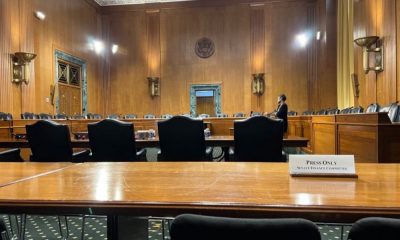National
National news in brief: November 25
First Texas GOP elected comes out, Calif. may fight another ballot initiative, gay crack downs in Russia, and more

Texas Board of Education official comes out
DALLAS — Heading off an apparent ‘whisper campaign’ about his sexual orientation, a Republican Texas state Board of Education member seeking re-election has come out on his own, according to the Dallas Voice.
George Clayton, an academic coordinator at North Dallas High School, is seeking re-election to his position as Board of Education member from Richmond. Clayton sent an email to several news outlets last week in response to what Clayton called “the tyranny of misinformation and innuendo.” Clayton seized the seat in a 2010 Republican primary victory from long-time incumbent Geraldine “Tincy” Miller, who is seeking to reclaim the spot in 2012.
Coming out makes Clayton the first known openly gay elected Republican in Texas.
“It has come to my attention that one of my opponents in my bid for reelection to the State Board of Education and certain member(s) of the Golden Corridor Republican Women’s Club are questioning my sexual orientation,” Clayton said in his email.
“I wish to say that I, in fact, do have a male partner who lives with me in my home in Richardson, Texas. I hope this frank announcement satisfies Tincy Miller and the ladies associated with the Golden Corridor organization.”
New effort to end Calif. LGBT curriculum law
SACRAMENTO — Opponents of a new California law mandating the inclusion of historical figures from the LGBT and disabled communities in school curriculum have filed paperwork to begin collecting signatures supporting a ballot measure to gut the law, despite failing at an earlier attempt to collect enough signatures to place a referendum on the 2011 ballot.
The opponents are now seeking to convince 2012 voters to strip the LGBT language from the law, leaving the rest intact, according to Equality California.
“This initiative seeks to distort the history taught in California schools and present students with a censored, inaccurate view of our nation, which our coalition will not let stand,” James Gilliam, deputy executive director of the American Civil Liberties Union of Southern California, said in a statement last week.
N.C. Baptist church refuses to perform weddings
RALEIGH, N.C. — Breaking with other Baptist churches, the congregation at Pullen Memorial Baptist Church has voted to cease performing marriages in the church until same-sex unions are legal.
The congregation — led by lesbian pastor Nancy Petty — voted unanimously to prohibit the church’s pastor from performing legal marriage ceremonies for any couples unless the state ban on same-sex marriage is lifted, according to the website of the Raleigh-based publication, The News & Observer. The congregation also released a statement denouncing the proposed amendment to the North Carolina Constitution banning same-sex marriage in that state.
Language has qualified for the November 2012 ballot in North Carolina that would ban marriage rights and civil unions for same-sex couples in that state. Same-sex marriage is already barred in North Carolina state law.
The pastor will still be able to bless “holy unions,” which are open to all couples, but Petty is barred from signing marriage licenses required by the state to establish a legal marriage.
Russia cracks down on LGBT advocacy
ST. PETERSBURG, Russia — The New York Times is reporting that members of the Russian LGBT community are fearful that a crackdown on LGBT visibility in the nation is intensifying after one of Russia’s largest cities approved a ban on “propaganda of homosexuality.”
St. Petersburg, Russia’s second largest city, has followed two smaller, remote Russian cities in approving a ban on “public actions aimed at propagandizing sodomy, lesbianism, bisexuality, transgenderism among minors.” According to the Times piece, “at least one prominent Russian singer has already expressed concern that the law may affect his and other artists’ ability to perform in front of audiences and to market their records.”
In a bizarre moment during the debate, a city councilor proposed banning all rainbows.
“On St. Petersburg day we had posters all over the city with portraits of Peter the Great and a brightly colored rainbow under it,” she ranted, according to the Times. “How can there be a rainbow, which is the international gay symbol? And we have day-care centers called Rainbow and drug stores called Rainbow all over the city! … We are going to die out soon.”
Federal Government
Lambda Legal praises Biden-Harris administration’s finalized Title IX regulations
New rules to take effect Aug. 1

The Biden-Harris administration’s revised Title IX policy “protects LGBTQ+ students from discrimination and other abuse,” Lambda Legal said in a statement praising the U.S. Department of Education’s issuance of the final rule on Friday.
Slated to take effect on Aug. 1, the new regulations constitute an expansion of the 1972 Title IX civil rights law, which prohibits sex-based discrimination in education programs that receive federal funding.
Pursuant to the U.S. Supreme Court’s ruling in the landmark 2020 Bostock v. Clayton County case, the department’s revised policy clarifies that discrimination on the basis of sexual orientation and gender identity constitutes sex-based discrimination as defined under the law.
“These regulations make it crystal clear that everyone can access schools that are safe, welcoming and that respect their rights,” Education Secretary Miguel Cardona said during a call with reporters on Thursday.
While the new rule does not provide guidance on whether schools must allow transgender students to play on sports teams corresponding with their gender identity to comply with Title IX, the question is addressed in a separate rule proposed by the agency in April.
The administration’s new policy also reverses some Trump-era Title IX rules governing how schools must respond to reports of sexual harassment and sexual assault, which were widely seen as imbalanced in favor of the accused.
Jennifer Klein, the director of the White House Gender Policy Council, said during Thursday’s call that the department sought to strike a balance with respect to these issues, “reaffirming our longstanding commitment to fundamental fairness.”
“We applaud the Biden administration’s action to rescind the legally unsound, cruel, and dangerous sexual harassment and assault rule of the previous administration,” Lambda Legal Nonbinary and Transgender Rights Project Director Sasha Buchert said in the group’s statement on Friday.
“Today’s rule instead appropriately underscores that Title IX’s civil rights protections clearly cover LGBTQ+ students, as well as survivors and pregnant and parenting students across race and gender identity,” she said. “Schools must be places where students can learn and thrive free of harassment, discrimination, and other abuse.”
Michigan
Mich. Democrats spar over LGBTQ-inclusive hate crimes law
Lawmakers disagree on just what kind of statute to pass

Michigan could soon become the latest state to pass an LGBTQ-inclusive hate crime law, but the state’s Democratic lawmakers disagree on just what kind of law they should pass.
Currently, Michigan’s Ethnic Intimidation Act only offers limited protections to victims of crime motivated by their “race, color, religion, gender, or national origin.” Bills proposed by Democratic lawmakers expand the list to include “actual or perceived race, color, religion, gender, sexual orientation, gender identity or expression, ethnicity, physical or mental disability, age, national origin, or association or affiliation with any such individuals.”
Democratic Gov. Gretchen Whitmer and Attorney General Dana Nessel have both advocated for a hate crime law, but house and senate Democrats have each passed different hate crimes packages, and Nessel has blasted both as being too weak.
Under the house proposal that passed last year (House Bill 4474), a first offense would be punishable with a $2,000 fine, up to two years in prison, or both. Penalties double for a second offense, and if a gun or other dangerous weapons is involved, the maximum penalty is six years in prison and a fine of $7,500.
But that proposal stalled when it reached the senate, after far-right news outlets and Fox News reported misinformation that the bill only protected LGBTQ people and would make misgendering a trans person a crime. State Rep. Noah Arbit, the bill’s sponsor, was also made the subject of a recall effort, which ultimately failed.
Arbit submitted a new version of the bill (House Bill 5288) that added sections clarifying that misgendering a person, “intentionally or unintentionally” is not a hate crime, although the latest version (House Bill 5400) of the bill omits this language.
That bill has since stalled in a house committee, in part because the Democrats lost their house majority last November, when two Democratic representatives resigned after being elected mayors. The Democrats regained their house majority last night by winning two special elections.
Meanwhile, the senate passed a different package of hate crime bills sponsored by state Sen. Sylvia Santana (Senate Bill 600) in March that includes much lighter sentences, as well as a clause ensuring that misgendering a person is not a hate crime.
Under the senate bill, if the first offense is only a threat, it would be a misdemeanor punishable by one year in prison and up to $1,000 fine. A subsequent offense or first violent hate crime, including stalking, would be a felony that attracts double the punishment.
Multiple calls and emails from the Washington Blade to both Arbit and Santana requesting comment on the bills for this story went unanswered.
The attorney general’s office sent a statement to the Blade supporting stronger hate crime legislation.
“As a career prosecutor, [Nessel] has seen firsthand how the state’s weak Ethnic Intimidation Act (not updated since the late 1980’s) does not allow for meaningful law enforcement and court intervention before threats become violent and deadly, nor does it consider significant bases for bias. It is our hope that the legislature will pass robust, much-needed updates to this statute,” the statement says.
But Nessel, who has herself been the victim of racially motivated threats, has also blasted all of the bills presented by Democrats as not going far enough.
“Two years is nothing … Why not just give them a parking ticket?” Nessel told Bridge Michigan.
Nessel blames a bizarre alliance far-right and far-left forces that have doomed tougher laws.
“You have this confluence of forces on the far right … this insistence that the First Amendment protects this language, or that the Second Amendment protects the ability to possess firearms under almost any and all circumstances,” Nessel said. “But then you also have the far left that argues basically no one should go to jail or prison for any offense ever.”
The legislature did manage to pass an “institutional desecration” law last year that penalizes hate-motivated vandalism to churches, schools, museums, and community centers, and is LGBTQ-inclusive.
According to data from the U.S. Department of Justice, reported hate crime incidents have been skyrocketing, with attacks motivated by sexual orientation surging by 70 percent from 2020 to 2022, the last year for which data is available.
Twenty-two states, D.C., Puerto Rico, and the U.S. Virgin Islands have passed LGBTQ-inclusive hate crime laws. Another 11 states have hate crime laws that include protections for “sexual orientation” but not “gender identity.”
Michigan Democrats have advanced several key LGBTQ rights priorities since they took unified control of the legislature in 2023. A long-stalled comprehensive anti-discrimination law was passed last year, as did a conversion therapy ban. Last month the legislature updated family law to make surrogacy easier for all couples, including same-sex couples.
A bill to ban the “gay panic” defense has passed the state house and was due for a Senate committee hearing on Wednesday.
Indiana
Drag queen announces run for mayor of Ind. city
Branden Blaettne seeking Fort Wayne’s top office

In a Facebook post Tuesday, a local drag personality announced he was running for the office of mayor once held by the late Fort Wayne Mayor Tom Henry, who died last month just a few months into his fifth term.
Henry was recently diagnosed with late-stage stomach cancer and experienced an emergency that landed him in hospice care. He died shortly after.
WPTA, a local television station, reported that Fort Wayne resident Branden Blaettne, whose drag name is Della Licious, confirmed he filed paperwork to be one of the candidates seeking to finish out the fifth term of the late mayor.
Blaettner, who is a community organizer, told WPTA he doesn’t want to “get Fort Wayne back on track,” but rather keep the momentum started by Henry going while giving a platform to the disenfranchised groups in the community. Blaettner said he doesn’t think his local fame as a drag queen will hold him back.
“It’s easy to have a platform when you wear platform heels,” Blaettner told WPTA. “The status quo has left a lot of people out in the cold — both figuratively and literally,” Blaettner added.

The Indiana Capital Chronicle reported that state Rep. Phil GiaQuinta, who has led the Indiana House Democratic caucus since 2018, has added his name to a growing list of Fort Wayne politicos who want to be the city’s next mayor. A caucus of precinct committee persons will choose the new mayor.
According to the Fort Wayne Journal Gazette, the deadline for residents to file candidacy was 10:30 a.m. on Wednesday. A town hall with the candidates is scheduled for 6 p.m. on Thursday at Franklin School Park. The caucus is set for 10:30 a.m. on April 20 at the Lincoln Financial Event Center at Parkview Field.
At least six candidates so far have announced they will run in the caucus. They include Branden Blaettne, GiaQuinta, City Councilwoman Michelle Chambers, City Councilwoman Sharon Tucker, former city- and county-council candidate Palermo Galindo, and 2023 Democratic primary mayoral candidate Jorge Fernandez.
-

 District of Columbia2 days ago
District of Columbia2 days agoReenactment of first gay rights picket at White House draws interest of tourists
-

 District of Columbia2 days ago
District of Columbia2 days agoNew D.C. LGBTQ+ bar Crush set to open April 19
-

 Arizona2 days ago
Arizona2 days agoAriz. governor vetoes anti-transgender, Ten Commandments bill
-

 Africa4 days ago
Africa4 days agoUgandan activists appeal ruling that upheld Anti-Homosexuality Act












